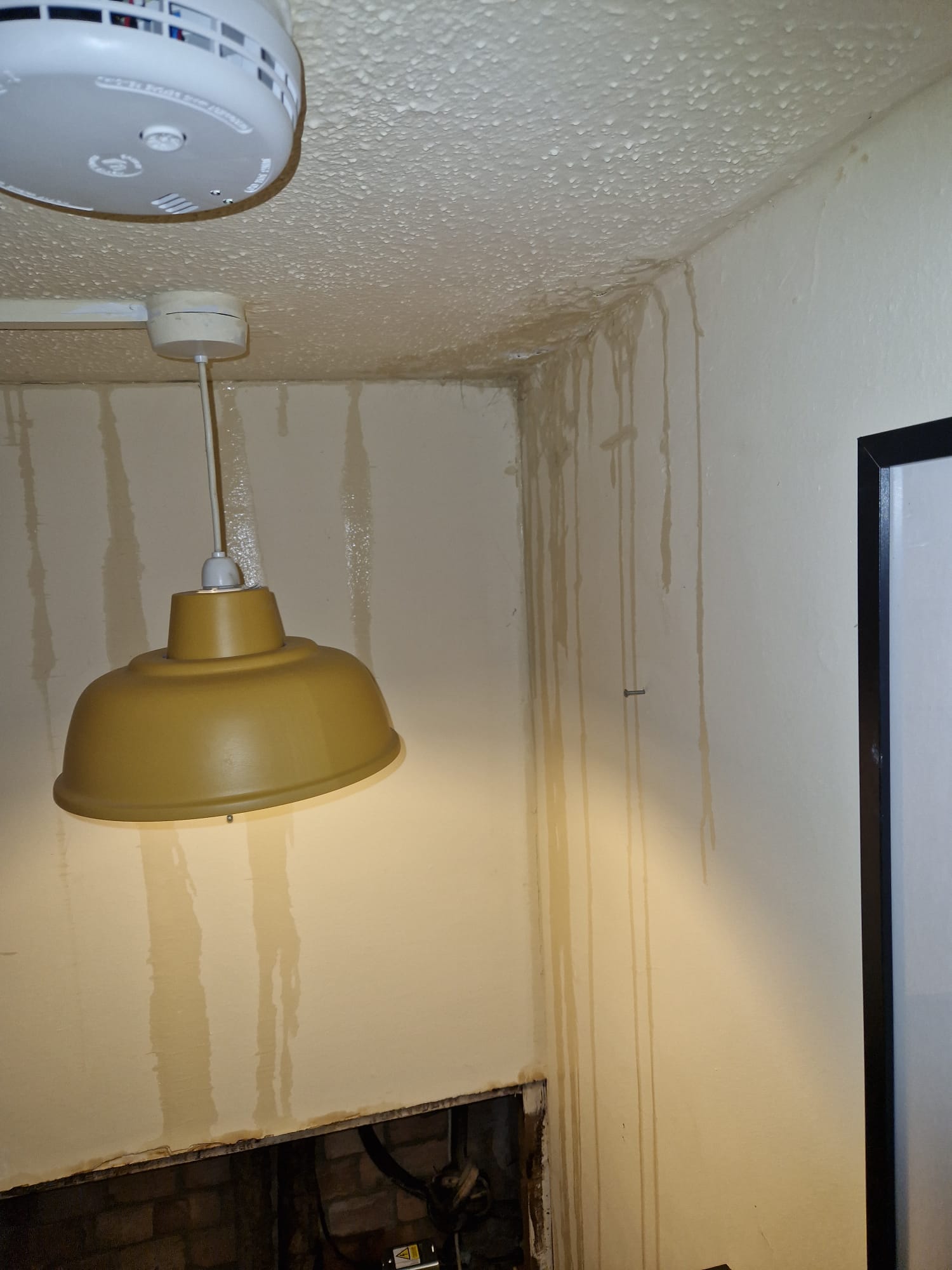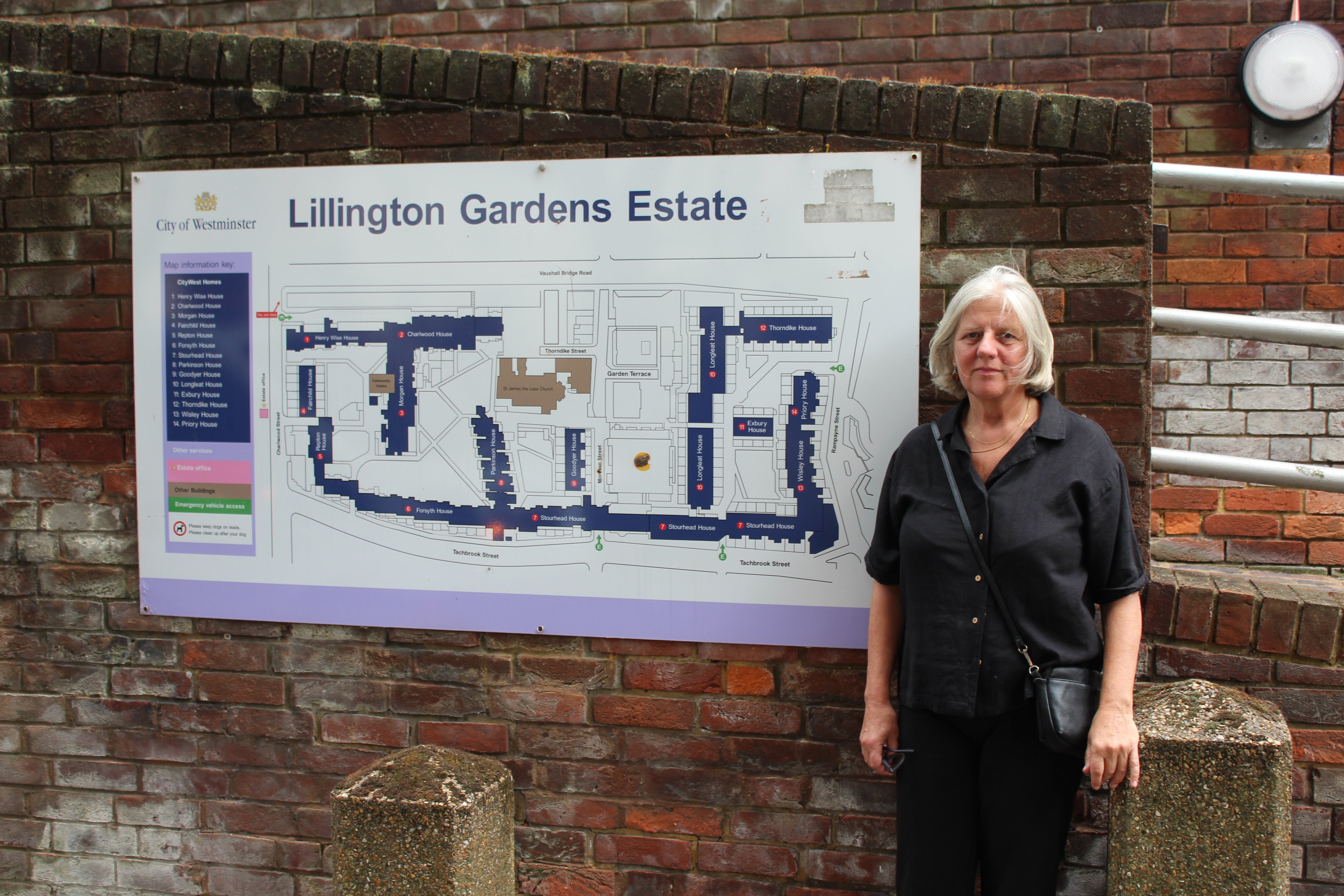When 73-year-old pensioner Pat Findley moved into Lillington and Longmoore Gardens before the turn of the millennium, she was ecstatic.
The 1970s grade-II listed estate in Pimlico, with around 1,000 homes, was an award-winning complex boasting “beautiful” brutalist architecture and a quaint garden room at its centre. The council was attentive; the community was close-knit.
But fast forward three decades, and Ms Findley says she feels like she’s “at war”.
In the past year, roofs have collapsed, flats have flooded, residents have been hospitalised by scalding or “contaminated” water, and sewage pipes have burst, causing the smell of faeces to permeate through the estate. Ms Findley says there is a new issue “every three months”. Her own flat is infested with woodlice.
Families have been evacuated, and residents have been left sleep-deprived and struggling to work after failed attempts to fix leaks and persistent mould.
A recent freedom of information request found that the estate needed 2,086 plumbing repairs between January 2020 and March 2025. The estate has since been nicknamed “leaky Lillington”.

Leaseholders, nevertheless, have seen their maintenance bills skyrocket, as they foot half the costs of the council’s decisions.
But Westminster Council, she says, which owns and manages the estate, is stubborn in the face of the residents’ complaints. One leaseholder, who asked to be anonymous out of fear for reprisal from the council, put it plainly: “The council see us as the enemy.”
The council has dismissed these allegations, saying it has a “thorough complaints process” and that it has “apologised for any stress caused”. When asked about the specific issue of leaking, a spokesperson claimed it was due to “an ageing communal hot water and heating system that needs to be replaced”, adding that the council was “working towards finding a more efficient, reliable and sustainable option”.
Its acceptance of problems notwithstanding, the council received top marks when the housing regulator inspected the estate in February this year. This prompted at least 55 residents to co-sign a letter disputing the result to Labour deputy prime minister Angela Rayner. They accused the council and the regulator of “marking their own homework”. A response from Ms Rayner’s team, three months later, directed the residents to make a complaint to Westminster Council.


Now, Ms Findley says she wishes she had “never moved into that plot in the first place”.
“They don’t give a toss and we’re treated like dirt,” she says. “I don’t need the stress any more. It’s grinding me down.”
The only relief is the community of residents that have rallied around one another.
In the time that Ms Findley has lived in Lillington, social housing across the UK has fallen into disrepair following chronic underinvestment and neglect, as the central government has shifted the burden of responsibility for these homes onto less well-funded local councils.
When The Independent visited the estate and spoke to residents from houses across the complex, one theme was common: Lillington and Longmoore Gardens is dangerous and a disaster is waiting to happen. London Fire Brigade last year raised concerns with Westminster Council about safety issues in the estate.
Many of the residents asked to be quoted anonymously because they feared repercussions, even eviction. Ernest Stafford, from the residents’ association, urged the council to reassure residents that they are allowed to voice concerns about the estate without fear of being evicted. However, the council reportedly declined to intervene, prompting accusations from the residents that the council was “quite happy to intimidate” people into silence.
One resident, a mother of three, says she is “extremely concerned” by the council’s lackadaisical approach to dangerous situations. She has spent the past year battling a repeatedly collapsing and leaking ceiling in her flat. “My life can’t get any worse than it is, sadly,” she says. “I’ve been through it all.”

She describes an incident in January in which the block’s fuse box was left on fire after an electrician contracted by the council declined to properly investigate why the lights in several flats were flickering. The blazing box was discovered by an employee of UK Power Networks after the resident called for help.
“I dread to think what might have happened if they hadn’t come when they did,” she says, adding that her block is full of vulnerable and elderly people. “It posed a real and serious danger to the safety of everyone in the building.”
Another resident in a different house in the estate says she “suffered long periods of sleep deprivation and stress” after the roof on her building began badly leaking, partially flooding her flat. A poor repair meant the leaking persisted for years. A previous leak in her flat took months for the council to fix.
“I have never felt the council take into account the impact of their poor repairs processes on residents’ day-to-day life and wellbeing,” she says. “There was generally little sense of urgency or understanding of my issues, it was just another job number to them.”
Underscoring what the residents say is apathy from the council is the poor management of costs and a lack of accountability and transparency.

The role of head of repairs for Westminster Council has changed four times in the last two years, stifling attempts to remedy the issues with repairs. An advert placed for the role last year, listing the salary as up to £120,000, further upset the residents.
A leaseholder in another building provided documents that showed her maintenance costs had doubled to nearly £7,000 in just a few years.
Included in those costs was a bill to be paid by all the leaseholders of that block for £8,300, to cover the insurance and maintenance of the lifts. She said she had not seen a single lift operator tending to the elevators since she moved in.
“If the contractor says they have to do something, the council just says yes,” she says. “There is no traceability of any kind.”
Ed Pitt Ford, the Conservative councillor for Pimlico North, says the current Labour council, in place since 2022, is “wasting a huge amount of money” without oversight.
“It feels like the contractors are operating unsupervised, the contracts are not being managed and hence a huge amount of money is being wasted,” he says.



